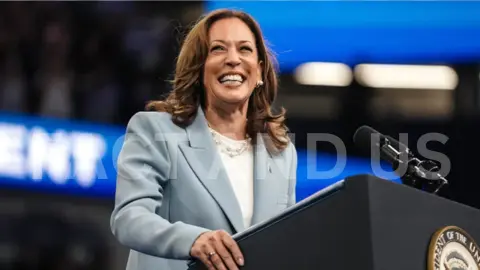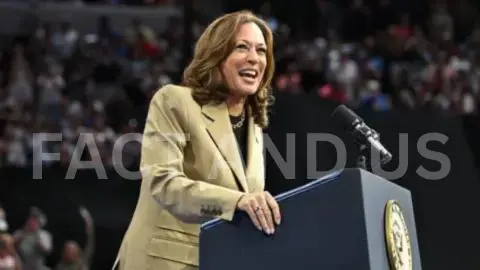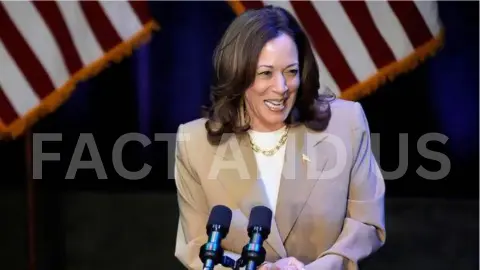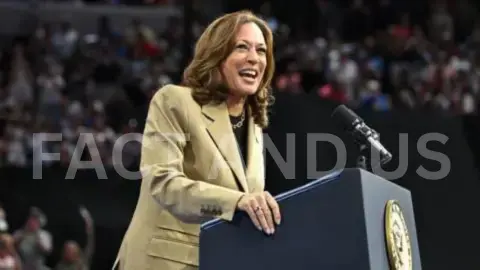With that simple diss – as well as an overall more streamlined message – Vice-President Kamala Harris’s presidential campaign has shifted the conversation away from the weaknesses of her boss, President Joe Biden, and shone a spotlight on her opponent, Donald Trump.

The change of tone was on full display at rallies this week, where she appeared with her new vice-presidential pick, Minnesota Governor Tim Walz. With Beyonce’s Freedom as their soundtrack, the pair made the case that they were out to protect American freedoms while their “weird” Republican opponents, Trump and his running mate JD Vance, threatened to take them away.
“We’re not going back,” Ms Harris told an enthusiastic crowd in Philadelphia, leading a chorus of what has become the campaign’s de-facto slogan. It is a stripped-back version of Mr Biden’s 2020 message – that Trump is a “threat to democracy” – that casts the former president as out of touch with American life. Even the vice-president’s press releases, sent from a campaign that once served Mr Biden, have reflected the tone shift from deeply serious to something more light-touch.
Just five days after Mr Biden stepped aside, a Harris spokesperson quipped that a Trump speech made him sound “like someone you wouldn’t want to sit near at a restaurant”. Campaign strategists say this new messaging appears to be cutting through with Democrat-leaning voters because it makes voting for Ms Harris sound more like a common-sense choice, and less like a civic chore. But it is too early to tell if this fresh goodwill for a vice-president who, until recently, struggled to grab the attention of American voters will last until November’s election day.


California Lieutenant Gov Eleni Kounalakis, a Democrat who considers the vice-president a close friend, said the campaign’s fresh rhetoric reflects Ms Harris’s “great sense of humour” and her ability to be “a good communicator on a very basic level”. “The fact is, these things are proving to be her strengths, and her joyfulness is breaking through the dark, menacing undertones of Donald Trump and his running mate.”
Meanwhile, Trump, who has long been known as an effective mudslinger and energetic campaigner since he entered politics during the 2016 presidential campaign, has struggled to punch back – especially against the “weird” framing. “They’re the weird ones. Nobody’s ever called me weird. I’m a lot of things, but weird I’m not,” Trump said last week in an interview with conservative radio host Clay Travis.
Contents
A honeymoon of free press

Ms Harris, who once trailed Trump, is now on the front foot, polls suggest.
A survey conducted by the New York Times and Siena College from 5 to 9 August puts Ms Harris ahead of Trump by 50% to 46% in three key battleground states – Wisconsin, Pennsylvania and Michigan. It comes after a recent YouGov poll, conducted on 4-6 August, which suggested she would win the popular vote, with 45% of respondents saying they would vote for her in November, compared to 43% for Trump.
That is a reversal of fortunes. A similar poll by YouGov, conducted almost three weeks ago, showed her losing by three points. David Polyansky, who served as deputy campaign manager for Florida’s Republican Governor Ron DeSantis’s 2024 presidential campaign, said that this shift could be because Ms Harris was beating Trump at his own game.
Since he first ran for president, Trump has benefited from being the main political story in the country, enjoying what political insiders like to call “earned media”, or free press. But it is Ms Harris’s dramatic swing to the top of the Democratic ticket just weeks before the Democratic National Convention that has dominated headlines and airwaves in recent weeks – and she has done it without sitting down for a major media interview.

The Power of Authenticity
At first glance, being dubbed “weird” might seem like an unwelcome critique. However, for Kamala Harris, this label has become a tool for authenticity. In a political arena frequently criticized for its polished veneers and rehearsed rhetoric, Harris’s unique approach stands out. Her willingness to defy conventional norms and present herself in a more genuine, sometimes unconventional manner resonates with a public weary of homogenized political figures.
Harris’s “weirdness” is not about eccentricity for its own sake but about breaking away from established norms and expectations. This authenticity allows her to connect with voters who feel disillusioned by traditional political personas. It’s a strategic shift from the usual polished personas to a more relatable, human touch.
Is ‘weird’ working with voters?
Some political consultants marveled at the “weird” label’s effectiveness. Many said that it broke through because it felt authentic, was not an audience-tested catchphrase or cliche, and it came about “fast and organically”.
Calling Trump and JD Vance “weird” effectively repackaged President Biden’s “threat to democracy” theme in a “very understandable – almost light-hearted – way that was maybe less severe and more colloquial”, said Brian Brokaw, who worked on several of Ms Harris’ campaigns and ran a Super PAC that supported her presidential campaign in 2020.

He said the term immediately helped to recast the race from a referendum on Mr Biden’s four years in office to a question of “do we really want to go back to what we were doing during the Trump era?”
Republican pollster Frank Luntz was more sceptical.
On BBC Newsnight on Tuesday, he declared Ms Harris the new front runner, noting she had captured fresh “momentum”.
But he dismissed the “weird” label as “weird in itself”, saying it didn’t resonate with voters.
A looming election
Ms Harris’s “brat summer” will not last forever.
While the pick of Mr Walz and the upcoming Democratic National Convention will be certain to maintain Ms Harris’s media dominance, experts agree that the campaign will have to change gears soon.
Mr Brokaw, a long-time adviser to Ms Harris, said that her campaign will need to work to bottle the enthusiasm it has enjoyed since the vice-president became the Democratic nominee.

“The peak of the honeymoon period is the convention, and then it’s going to be a grind for two months probably with some debates,” Mr Brokaw said. “This is an exciting period of time, but at a certain point it’s going to come back to reality and then it’s go time.”
“If we’re still talking about Trump and Vance being weird in October, I think I’d be surprised,” he added.
David Polyanksy, the Republican strategist, said the label “works well from a 60,000 foot view”, but he believed a message on the economy and immigration would ultimately sway voters in November.

Building a Broader Coalition
Moreover, the “weird” label can help Harris build a broader coalition of supporters. By being unapologetically herself, she attracts a diverse group of individuals who may feel marginalized or disconnected from mainstream politics. Her unconventional style speaks to a broader range of voters who are looking for leaders who are not afraid to break away from traditional molds.
In this context, “weirdness” becomes a symbol of inclusivity and openness. It signals to various voter demographics—especially younger generations and those from non-traditional backgrounds—that their voices and perspectives are valued in the political discourse.
Conclusion
Kamala Harris’s adoption of the “weird” label is a calculated and strategic choice rather than a mere label. It reflects a deeper understanding of the current political climate and the evolving nature of voter expectations. By embracing and redefining what it means to be “weird,” Harris not only differentiates herself from traditional political figures but also connects with a broader, more diverse electorate. In doing so, she turns a potentially negative label into a strategic asset, showcasing her ability to innovate and resonate in an ever-changing political landscape.
Stay connected with Fact and US for more such news.
